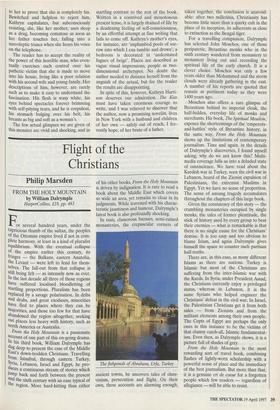Flight of the Christians
Philip Marsden
FROM THE HOLY MOUNTAIN by William Dalrymple HarperCollins, £18, pp. 483 For several hundred years, under the capricious thumb of the sultan, the peoples of the Ottoman empire lived if not in com- plete harmony, at least in a kind of pluralist equilibrium. With the eventual collapse of the empire earlier this century, its fringes — the Balkans, eastern Anatolia, the Levant — were left to fend for them- selves. The fall-out from that collapse is still being felt — as intensely now as ever. In the last decade all three of those regions have suffered localised bloodletting of startling proportions. Pluralism has been replaced by a savage polarisation. In dribs and drabs, and great exoduses, minorities have fled to places where they can be majorities, and those too few for that have abandoned the region altogether, seeking out places less heavy with history, such as north America or Australia.
From the Holy Mountain is a passionate account of one part of this on-going drama. In his third book, William Dalrymple has dug deep to present the case of the Middle East's down-trodden Christians. Travelling from Istanbul, through eastern Turkey, SYria, Lebanon, Israel and Egypt, he pro- duces a continuous stream of stories which Jump back and forth between the present and the sixth century with an ease typical of the region. More hard-hitting than either of his other books, From the Holy Mountain is driven by indignation. It is rare to read a book about the Middle East which covers so wide an area, yet remains so clear in its judgments. While leavened with his charac- teristic jauntiness and humour, Dalrymple's latest book is also profoundly shocking.
In taxis, clamorous bazaars, semi-ruined monasteries, the crepuscular corners of The fishponds of Abraham, Urfa, Turkey ancient towns, he uncovers tales of chau- vinism, persecution and flight. On their own, these accounts are alarming enough: taken together, the conclusion is unavoid- able: after two millennia, Christianity has become little more than a quirky cult in the place of its inception, its adherents as close to extinction as the Bengal tiger.
For a travelling companion, Dalrymple has selected John Moschos, one of those peripatetic, Byzantine monks who in the sixth century wandered from monastery to monastery living out and recording the spiritual life of the early church. It is a clever choice. Moschos was only a few years older than Mohammed and the storm clouds were already gathering in the east. A number of his reports are quoted that remain as pertinent today as they were 1400 years ago.
Moschos also offers a rare glimpse of Byzantium behind its imperial cloak, the half-hidden, everyday life of monks and merchants. His book, The Spiritual Meadow, exposes the shortcomings of the 'emperors- and-battles' style of Byzantine history; in the same way, From the Holy Mountain shows up the limitations of contemporary journalism. Time and again, in the details of Dalrymple's discoveries, I found myself asking; why do we not know this? Multi- media coverage lulls us into a deluded state of omniscience. We have read about the Kurdish war in Turkey, seen the civil war in Lebanon, heard of the Zionist expulsion of Palestinians, the extremist Muslims in Egypt. Yet we have no sense of proportion. The sense of unsung tragedy accumulates throughout the chapters of this large book.
Given the consistency of this story — the crumbling monasteries occupied by single monks, the tales of former plentitude, the stick of history used by every group to beat their enemies — what is remarkable is that there is no single cause for the Christians' demise. It is too easy and too obvious to blame Islam, and again Dalrymple gives himself the space to counter such partisan half-truths.
There are, in this case, as many different Islams as there are nations. Turkey is Islamic but most of the Christians are suffering from the inter-Islamic war with the Kurds. In Syria, under President Assad, the Christians currently enjoy a privileged status, whereas in Lebanon, it is the same Syrians who helped engineer the Christians' defeat in the civil war. In Israel, the Palestinian Christians get it from both sides — from Zionists and from the militant elements among their own people. The Copts of Egypt are perhaps the only ones in this instance to be the victims of that clumsy catch-all, Islamic fundamental- ism. Even then, as Dalrymple shows, it is a picture full of shades of grey.
From the Holy Mountain is the most rewarding sort of travel book, combining flashes of lightly-worn scholarship with a powerful sense of place and the immediacy of the best journalism. But more than that, it is a genuine cri de coeur for a forgotten people which few readers — regardless of allegiance — will be able to resist.


































































 Previous page
Previous page